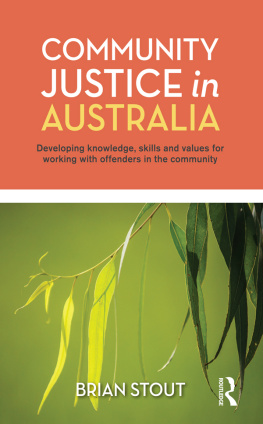First published in Great Britain in 2016 by
Policy Press University of Bristol 1-9 Old Park Hill Bristol BS2 8BB UK Tel +44 (0)117 954 5940
Policy Press 2016
British Library Cataloguing in Publication Data
A catalogue record for this book is available from the British Library.
Library of Congress Cataloging-in-Publication Data
A catalog record for this book has been requested.
ISBN 978-1-4473-5877-0 paperback
ISBN 978-1-4473-5878-7 ePub
ISBN 978-1-4473-5879-4 ePdf
The right of Malcolm Cowburn and Steve Myers to be identified as authors of this work has been asserted by them in accordance with the Copyright, Designs and Patents Act 1988.
All rights reserved: no part of this publication may be reproduced, stored in a retrieval system, or transmitted in any form or by any means, electronic, mechanical, photocopying, recording, or otherwise without the prior permission of Policy Press.
The statements and opinions contained within this publication are solely those of the authors and not of the University of Bristol, Policy Press or the British Association of Social Workers. The University of Bristol, Policy Press and the British Association of Social Workers disclaim responsibility for any injury to persons or property resulting from any material published in this publication.
Policy Press works to counter discrimination on grounds of gender, race, disability, age and sexuality.
Cover design by Policy Press
Front cover: image kindly supplied by istock
Both authors owe their thanks to Professor Viv Cree for her comments and suggestions on an earlier draft of this book.
Malcolm Cowburn would like to thank the following people for reading early drafts of parts of this book: Gary Gunby, Safeguarding coordinator of Buckfast Abbey; Professor Michael Hauskeller, Exeter University; Dr Sarah Nelson, Edinburgh University; Dr Steve Riley, Faculty of Humanities, University of Utrecht; Anne Robinson, Sheffield Hallam University; and Professor Kim Stevenson, Plymouth University. In addition, immeasurable thanks go to his partner Hilary Pengelly for her support, for reading and commenting on many drafts, and for enduring a houseguest that had long outstayed its welcome.
Steve Myers would like to thank all at The Junction project in Rotherham for their creative practice over the years. Thanks also go to Judith Milner for her support and ideas, David Bottomley for patience beyond usual expectations, and those colleagues at the University of Salford and further afield who have provided critical perspectives on the complexities of social work practice.
Introduction: constructing sex crimes and sex offenders
Introduction
Social work with people who sexually harm others is complex and demanding. It involves feelings, thoughts and actions, and is imbued with values. It occurs in a range of settings and is undertaken by qualified, trainee and unqualified social workers. A social work approach incorporates values, psychological perspectives and consideration of sexual violence as part of a social context. Social work is not an activity undertaken by isolated workers; it takes place within agencies that have policies and procedures to guide practice. This book is not a replacement for official guidance; rather, it seeks to provide an in-depth exploration of issues that make up social work practice. Practice issues are located in the social, political, administrative and welfare context of the UK, primarily focusing on England and Wales; while policy and procedural issues may remain geographically specific, other matters have a wider currency.
Social work is currently undergoing radical change in the UK due to central government initiatives designed to address perceived (albeit contested) shortcomings in education and practice. This means that any description of how social work is delivered is contingent and subject to significant caveats, including the increasing tendency for the four constituent nations (England, Wales, Scotland and Northern Ireland) to develop their own health and welfare services and structures. In addition to this, there is a move to more regionalised approaches to welfare delivery within England itself, devolving increased public service financial responsibility to newly constituted political bodies that will take localised decisions on what is the best model to meet their needs. Inevitably, there will be a fragmentation of structures that social workers find themselves practising in, which may lead to the development of very different approaches and job expectations.
Social workers currently work in what can be broadly termed as statutory services (local government and some charitable organisations with legal mandates to provide specific services, as well as criminal justice agencies) and private, voluntary or independent (PVI) organisations. The former tend to have duties placed on them for delivering core elements of policy, whereas the PVI sector provides services that are contracted or seen as complementary, although this distinction has become increasingly blurred with a decrease in state-delivered services and an increase in contracting out services to the PVI sector.
Social workers have tended to specialise in working either with children (and their families) or working with adults, a distinction that has grown over the previous 30 years and looks likely to continue through, for example, the appointment of separate chief social workers for children and for adults in England (Department of Health, 2014).
The landscape is further complicated by those who focus on mental health and learning disability, which constitute separate fields of practice. Criminal justice is also a separate social work domain in England, although it is seen as a core social work activity in Scotland. Increasingly, adult services in England are being organised and delivered within overall health provision and it is likely that social workers with adults will be part of an integrated health and community social care framework.
Wherever social workers are located, they work in multidisciplinary structures to deliver their service, and this is often supported by explicit policy recommendations. A range of professionals with different skills is encouraged to work in complementary ways in order to enhance welfare and to safeguard vulnerable people. This recognises that people have multiple needs that are best met by applying appropriate skills and knowledge, and social workers are often at the forefront of making assessments and judgements about the required level of intervention and resources. As we see in later chapters, responses to sexual offending and the safeguarding of vulnerable people require social workers to collaborate with criminal justice, health, education and other welfare professionals. Throughout the book, we explore the particular skills, values and knowledge that social workers utilise to ensure that individual and community safety is enhanced.
The aims of this book are:
to recognise the emotional context of working with people who sexually harm others;
to consider values and ethics underpinning practice;
to reflect critically on current theories, research, policy and practice in relation to people who have sexually harmed others; and





